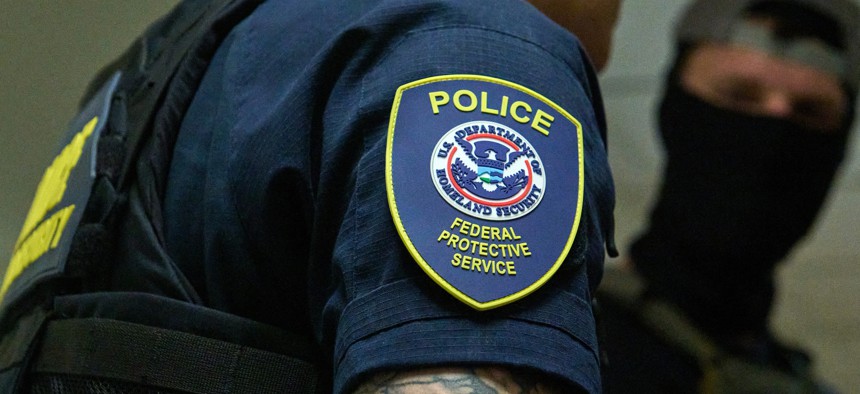
The Federal Protective Service is responsible for guarding more than 8,500 federal buildings. DOMINIC GWINN/Getty Images
Oversight of contract security guards at federal buildings is the focus of a House-passed bill
The legislation also would require the Federal Protective Service to overhaul the digital system for recording when such personnel are on duty. The Government Accountability Office has warned that the system is not properly functioning.
The House on Monday passed legislation that responds to issues flagged by watchdogs about oversight of contract security guards at federal buildings.
The Personnel Oversight and Shift Tracking Act of 2025 (H.R. 3425), approved 402-0, would require the Federal Protective Service, which is responsible for guarding more than 8,500 facilities, to “establish processes to strengthen oversight, performance and accountability of contract security personnel.”
Specifically, it would task FPS with developing a standardized process for collecting and analyzing the results of covert security tests when the employees don’t know that they’re being evaluated and mandating contract security companies to provide corrective training to any personnel who fail such tests.
The Government Accountability Office in March reported that contract guards who screen individuals entering federal buildings failed to detect prohibited items (e.g. baton, pepper spray) in about half of covert tests that its investigators conducted. GAO also analysed nearly 500 such evaluations performed by FPS between 2020 and 2023 and found that roughly half of the time the contract security did not notice the prohibited item.
GAO recommended that FPS improve information collection from covert tests, analysis of such data as well as training based on identified failures.
Likewise, the inspector general for the Homeland Security Department in 2024 issued a report on contract security guards and found that FPS officials frequently did not conduct required follow-up inspections after a deficiency was found during an evaluation. The IG also flagged several security failures, including a guard who didn’t appropriately report an in-person bomb threat, one who wasn’t wearing his body armor or shoes on the job and another who told a visitor to put their firearm in the bushes to re-enter a building.
Additionally, the bill would give FPS six months to decide whether to replace or fix its post tracking system that is used to determine which posts contract guards are currently staffing.
FPS in 2018 launched PTS to replace a paper-based system to track when contract security guards start and end their shifts. GAO in its March report, however, found that the agency still hasn’t fully deployed the system due to “unexpected costs and delays,” such as widespread issues with simply signing in, there’s no timeline to complete implementation of PTS and employees continue to need to clock in and out on paper sheets.
Because of this, FPS cannot provide real-time information about the staffing of guard posts, which could help avoid office closures. IRS officials told GAO investigators that they’ve had to close 30 taxpayer assistance centers for a full day since fiscal 2022 because of a lack of contract guards, while the Social Security Administration reported that over the last three fiscal years there have been 510 instances when guard shortages have caused office closures for several hours or entire days.
Rep. Mike Kennedy, R-Utah, the bill’s sponsor, described PTS as "embarrassing."
“Years later, the system still doesn't work, and the agency is still relying on paper as its official record. That means Washington can’t even confirm in real time whether a building is staffed and secure,” he said during floor remarks Monday. “In some cases, buildings have had to close because of it. That is a waste of money and a failure of leadership.”
FPS in fiscal 2024 spent nearly $1.7 billion on contract guards to protect 2,500 facilities.
While federal building security has been a longstanding issue, it has gotten more attention in recent weeks.
Many Centers for Disease Control and Prevention headquarters employees are returning to in-person work on Sept. 15 about one month after a gunman who opposed the COVID-19 vaccine fired hundreds of bullets at the Atlanta campus, killing a responding police officer before commiting suicide.
Federal property management has been on GAO’s high-risk list of programs that are vulnerable to waste, fraud and abuse since 2003 partly because of security shortfalls.
Share your news tips with us: Sean Michael Newhouse: snewhouse@govexec.com, Signal: seanthenewsboy.45
NEXT STORY: Democrats want to know how the Forest Service is funding its deferred resignation program







